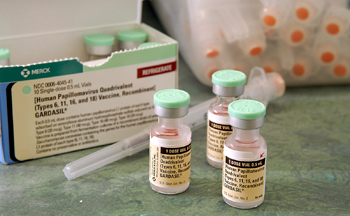WHAT IS HPV?Human papillomavirus, or HPV, is the most common sexually transmitted disease. Usually the body's immune system clears an HPV infection naturally within a couple of years, but certain types cause genital warts or cancers. About 20 million Americans are infected with HPV, and another 6.2 million people become infected each year. At least half of sexually active men and women acquire genital HPV infection at some point in their lives.Source: U.S. Centers for Disease Control and Prevention
North Georgia health departments are now offering a free vaccine for HPV, a sexually transmitted disease that is the leading cause of cervical cancer.
Federal economic stimulus funding has allow the North Georgia public health departments - including those in Catoosa, Dade and Walker counties - to offer the vaccine to children up to age 18 for the next 12 to 18 months, said Stacy Henderson, registered nurse and clinical nurse coordinator at the Catoosa County Health Department. The vaccine is approved for boys and girls, from ages 9 to 26.
"The important thing is to really get this vaccine before they're sexually active, before introducing any of these viruses," she said.
Gardasil is the first vaccine to protect against some strains of HPV. The vaccine protects against two strains of HPV that cause 70 percent of cervical cancers and two other strains of the virus that cause 90 percent of genital warts cases, according to the drug's manufacturer, Merck & Co.
Some local gynecologists say the vaccine could help wipe out the cancer.
But the HPV vaccine - given in the form of three doses over six months - has worried some parents who hesitate to vaccinate their children against a disease transmitted through sex, local doctors said.
"We hear that a lot, actually," said Dr. Matt Smith, a Dalton-based OB-GYN.
Parents ask, "'If you give the vaccine, is it somehow consenting to the fact that they'll be sexually active at some point?' Well, if you expect to ever have grandchildren, then they'll eventually be sexually active."
Dr. Chip Harris of Erlanger South Family Medicine Practice in Ringgold, Ga., said more parents are feeling comfortable with the vaccine.
"It's not a carte blanche to go behind the stadium with your boyfriend. It's for long-term health care," he said.
Most doctors prefer to give the vaccine to children around age 11 or 12, hopefully long before the children become sexually active and could become exposed to HPV.
At least half of sexually active men and women acquire genital HPV infection at some point in their lives, according to the U.S. Centers for Disease Control and Prevention.
Some doctors have been reluctant to bring up the possibility of the vaccine among younger patients ages 11 to 12, and more parents of these younger patients have refused the vaccine for their children, according to a survey published in the September edition of Pediatrics. The doctors were surveyed in 2008.
But Dr. Smith said that recently the vaccine has become more accepted.
"Hopefully, eventually it'll be just like vaccinating people for mumps or measles," he said.

